Integrating with Satellite 6 During Provisioning
It is a relatively common requirement to register newly provisioned Linux VMs directly with Satellite 6 (or Foreman) as part of the provisioning process. This ensures that the resultant VM is patched and up to date, and is configured by Puppet according to a server role.
Registering a new system with Satellite 6.1 currently requires two operations. We need to create a Satellite Host entry, which registers the server as a configuration management client, manageable by Puppet. We also need to use subscription-manager to activate the server as a Content Host, which associates one or more Red Hat Subscriptions with the server, and makes software package repository content available.
In this example we'll look at the changes that we need to make to our provisioning workflow to make this happen.
Christian Jung's excellent blog also contains several articles on CloudForms and Foreman integration, particularly when provisioning using kickstart. Some of the code here is borrowed from Chris's examples.
The Challenge of Triggering the Client Operations
For this example we'll be provisioning into a VMware Provider, and cloning from fully installed 'fat' templates (i.e. no kickstarting). Cloning from Template (Infrastructure Providers) or Image (Cloud Providers) presents us with the challenge of how to initiate several commands on the new VM, including subscription-manager register, using dynamic arguments such as --activationkey or --org.
There are several ways of remotely running commands in a newly created VM, including:
- VMware VIX SDK Library to connect to VMware Tools runing in a guest (VMware only)
- cloud-init (RHEV, OpenStack and Amazon Providers)
- ssh, including Ansible (all Providers)
For flexibility (at the expense of some added complexity), we'll be triggering the subscription-manager registration of the newly provisioned system using an Ansible playbook, dynamically created as part of the provisioning workflow.
The Satellite 6 Host Entry
A Host entry in Satellite 6 requires certain parameters:
- Host Name
- Host's MAC address
- Location
- Organizaton
- Puppet Environment
- Architecture
- Operating System
- Media
- Partition Table
- Domain
- Root Password
We can however define a Host Group in Satellite, containing defaults for several of these parameters. When we create the Host entry, we can specify a Host Group as a configuration template.
Non-CloudForms Preparation
We need to do some preparation of our environment. To keep the example simple we'll allow for provisioning Red Hat Enterprise Linux 6 and 7 servers (both x86_64), but we'll create a single Generic Host Group and Activation Key for each operating system version.
Creating the Host Groups in Satellite 6
We'll create two Host Groups in Satellite 6, Generic_RHEL6_Servers and Generic_RHEL7_Servers:

These Host Groups will define defaults for:
- Puppet Environment
- Architecture
- Operating System
- Media
- Partition Table
- Domain
- Root Password
The Host Group will also install the motd and ntp Puppet modules.
Creating the Activation Keys in Satellite 6
When a newly provisioned system registers with Satellite as a Content Host, it can include an Activation Key name as an argument to subscription-manager.
We'll create two Activation Keys in Satellite 6, RHEL6-Generic and RHEL7-Generic:

These Activation Keys will define defaults for:
- Content View and Lifecycle Environment ('Production')
- Red Hat Subscriptions
- Repository Content Sets
Adding an SSH Key to the VMware Template
We're going to be using Ansible from the CloudForms server to set the new VM's hostname, register the new VM with Satellite, and install and run Puppet. We need to copy root's public key from the CloudForms server to the VMware Template and add to /root/.ssh/autorized_keys.
Installing and Configuring Ansible on the CloudForms Appliance
For convenience we'll install Ansible from the EPEL repository. We need to add the rhel-6-server-optional-rpms repository, and then the EPEL installation RPM on the CloudForms appliances with the Automation Engine role set:
subscription-manager repos --enable=rhel-6-server-optional-rpms
rpm -ivh https://dl.fedoraproject.org/pub/epel/epel-release-latest-6.noarch.rpm
Now we can install Ansible:
yum -y install ansible
Loaded plugins: product-id, security, subscription-manager
Setting up Install Process
cf-me-5.4-for-rhel-6-rpms | 3.1 kB 00:00
rhel-6-server-optional-rpms | 3.5 kB 00:00
rhel-6-server-optional-rpms/primary_db | 3.4 MB 00:16
rhel-6-server-rpms | 3.7 kB 00:00
rhel-server-rhscl-6-rpms | 3.1 kB 00:00
Resolving Dependencies
--> Running transaction check
---> Package ansible.noarch 0:1.9.2-1.el6 will be installed
--> Processing Dependency: python-simplejson for package: ansible-1.9.2-1.el6.noarch
--> Processing Dependency: python-paramiko for package: ansible-1.9.2-1.el6.noarch
--> Processing Dependency: python-keyczar for package: ansible-1.9.2-1.el6.noarch
--> Processing Dependency: python-jinja2 for package: ansible-1.9.2-1.el6.noarch
--> Processing Dependency: python-httplib2 for package: ansible-1.9.2-1.el6.noarch
--> Processing Dependency: python-crypto2.6 for package: ansible-1.9.2-1.el6.noarch
--> Processing Dependency: PyYAML for package: ansible-1.9.2-1.el6.noarch
--> Running transaction check
---> Package PyYAML.x86_64 0:3.10-3.1.el6 will be installed
--> Processing Dependency: libyaml-0.so.2()(64bit) for package: PyYAML-3.10-3.1.el6.x86_64
---> Package python-crypto2.6.x86_64 0:2.6.1-2.el6 will be installed
---> Package python-httplib2.noarch 0:0.7.7-1.el6 will be installed
---> Package python-jinja2.x86_64 0:2.2.1-2.el6_5 will be installed
--> Processing Dependency: python-babel >= 0.8 for package: python-jinja2-2.2.1-2.el6_5.x86_64
---> Package python-keyczar.noarch 0:0.71c-1.el6 will be installed
--> Processing Dependency: python-pyasn1 for package: python-keyczar-0.71c-1.el6.noarch
--> Processing Dependency: python-crypto for package: python-keyczar-0.71c-1.el6.noarch
---> Package python-paramiko.noarch 0:1.7.5-2.1.el6 will be installed
---> Package python-simplejson.x86_64 0:2.0.9-3.1.el6 will be installed
--> Running transaction check
---> Package libyaml.x86_64 0:0.1.3-4.el6_6 will be installed
---> Package python-babel.noarch 0:0.9.4-5.1.el6 will be installed
---> Package python-crypto.x86_64 0:2.0.1-22.el6 will be installed
---> Package python-pyasn1.noarch 0:0.0.12a-1.el6 will be installed
--> Finished Dependency Resolution
...
We probably want to disable the EPEL repo after installing this to ensure that we don't accidentally pull anything else down from it.
sed -i -e 's/enabled=1/enabled=0/' /etc/yum.repos.d/epel.repo
Uncomment host_key_checking in /etc/ansible/ansible.conf:
# uncomment this to disable SSH key host checking
host_key_checking = False
Modifying the CloudForms Provisioning Workflow
We need to make two additions to the VMProvision_VM State Machine. We need to add a RegisterSatellite state/stage to register the new VM with Satellite 6 as a Host. We also need to add an ActivateSatellite state/state to create the Ansible playbook, and initiate the subscription-manager activation of the new system as a Content Host.
Both of these stages must be added at some point after the VM has been provisioned. The registration must include the MAC address of the new VM, and the activation uses Ansible to connect via ssh to the running VM.
We add the new state/stages as follows:

RegisterSatellite
Our new RegisterSatellite Instance Schema can store some more defaults. In this case we'll create per-Organization/Location Instances, so that we can store the Organization name and Location in the schema:

The register_satellite Method can access these in the usual way, from $evm.object:
servername = $evm.object['servername']
username = $evm.object['username']
password = $evm.object.decrypt('password')
organization = $evm.object['organization']
location = $evm.object['location']
We need to ensure that we only register Linux VMs with Satellite, and we can select a Host Group by testing the VM operating_system object's .product_name attribute (we're only provisioning RHEL 6 or 7, both x86_64):
...
prov = $evm.root['miq_provision']
template = prov.source
vm = prov.destination
if template.platform == "linux"
#
# Pick a host group based on the operating system being provisioned
#
if vm.operating_system.product_name == 'Red Hat Enterprise Linux 6 (64-bit)'
hostgroup = 'Generic_RHEL6_Servers'
elsif vm.operating_system.product_name == 'Red Hat Enterprise Linux 7 (64-bit)'
hostgroup = 'Generic_RHEL7_Servers'
else
raise "Unrecognised Operating System Name"
end
...
(In a more advanced example we could present a selection of Host Groups to register with in a Service Dialog drop-down list - see Service Reconfiguration)
We'll be creating the new Host entry using the Satellite API, and this requires us to use the internal Satellite ID for each parameter, rather than a name. We define a generic query_id method, and call it three times to retrieve the IDs for the Location, Organization and Host Group:
def query_id (uri, field, content)
url = URI.escape("#{@uri_base}/#{uri}?search=#{field}=\"#{content}\"")
request = RestClient::Request.new(
method: :get,
url: url,
headers: @headers,
verify_ssl: OpenSSL::SSL::VERIFY_NONE
)
id = nil
rest_result = request.execute
json_parse = JSON.parse(rest_result)
subtotal = json_parse['subtotal'].to_i
if subtotal == 1
id = json_parse['results'][0]['id'].to_s
elsif subtotal.zero?
$evm.log(:error, "Query to #{url} failed, no result")
id = -1
elsif subtotal > 1
$evm.log(:error, "Query to #{url} returned multiple results")
id = -1
else
$evm.log(:error, "Query to #{url} failed, unknown condition")
id = -1
end
id
end
...
$evm.log(:info, "Getting hostgroup id for '#{hostgroup}' from Satellite")
hostgroup_id = query_id("hostgroups", "name", hostgroup)
raise "Cannot determine hostgroup id for '#{hostgroup}'" if hostgroup_id == -1
$evm.log(:info, "hostgroup_id: #{hostgroup_id}")
Finally we create the Host record. We specify the :build parameter as false because we don't want Satellite to provision the VM:
#
# Create the host record
#
hostinfo = {
:name => vm.name,
:mac => vm.mac_addresses[0],
:hostgroup_id => hostgroup_id,
:location_id => location_id,
:organization_id => organization_id,
:build => 'false'
}
$evm.log(:info, "Creating host record in Satellite")
uri = "#{@uri_base}/hosts"
request = RestClient::Request.new(
method: :post,
url: uri,
headers: @headers,
verify_ssl: OpenSSL::SSL::VERIFY_NONE,
payload: { host: hostinfo }.to_json
)
rest_result = request.execute
The full script is available here.
ActivateSatellite
Our new ActivateSatellite Instance Schema can also store some defaults. In this case we'll create per-Organization Instances, and we'll store the Organization name in the schema:
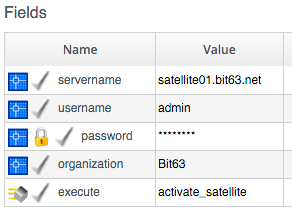
Once again we check that the system being provisioned is running Linux, and select the activation key based on the Operating System version:
if template.platform == "linux"
#
# Pick an activation key based on the operating system being provisioned
#
if vm.operating_system.product_name == 'Red Hat Enterprise Linux 6 (64-bit)'
activationkey = 'RHEL6-Generic'
elsif vm.operating_system.product_name == 'Red Hat Enterprise Linux 7 (64-bit)'
activationkey = 'RHEL7-Generic'
else
raise "Unrecognised Operating System Name"
end
We need to check that the VM is booted, and has an IP address:
if vm.ipaddresses.length.zero?
$evm.log(:info, "VM doesnt have an IP address yet - retrying in 1 minute")
$evm.root['ae_result'] = 'retry'
$evm.root['ae_retry_interval'] = '1.minute'
exit MIQ_OK
end
ip_address = vm.ipaddresses[0]
For this example we'll be connecting to the newly provisioned VM by IP address rather than hostname, so we have to add the new IP address to /etc/ansible/hosts if it doesn't already exist:
unless File.foreach('/etc/ansible/hosts').grep(/#{Regexp.escape(ip_address)}/).any?
open('/etc/ansible/hosts', 'a') do |f|
f.puts "#{ip_address}"
f.close
end
end
We need to remove the hosts key for that IP address if it already exists:
cmd = "ssh-keygen -R #{ip_address}"
`#{cmd}`
We create a temporary file, and write the Ansible playbook to it:
tempfile = Tempfile.new('ansible-')
playbook = []
this_host = {}
this_host['hosts'] = []
this_host['hosts'] = "#{ip_address}"
this_host['tasks'] << { 'name' => 'Set hostname',
'hostname' => "name=#{vm.name}"
}
this_host['tasks'] = []
this_host['tasks'] << { 'name' => 'Install Cert',
'command' => "/usr/bin/yum -y localinstall http://#{servername}/pub/katello-ca-consumer-latest.noarch.rpm"
}
this_host['tasks'] << { 'name' => 'Register with Satellite',
'command' => "/usr/sbin/subscription-manager register --org #{organization} --activationkey #{activationkey}",
'register' => 'registered'
}
this_host['tasks'] << { 'name' => 'Enable Repositories',
'command' => "subscription-manager repos --enable=rhel-*-satellite-tools-*-rpms",
'when' => 'registered|success'
}
this_host['tasks'] << { 'name' => 'Install Katello Agent',
'yum' => 'pkg=katello-agent state=latest',
'when' => 'registered|success',
'notify' => ['Enable Katello Agent', 'Start Katello Agent']
}
this_host['tasks'] << { 'name' => 'Install Puppet',
'yum' => 'pkg=puppet state=latest',
'when' => 'registered|success',
'register' => 'puppet_installed',
'notify' => ['Enable Puppet']
}
this_host['tasks'] << { 'name' => 'Configure Puppet Agent',
'command' => "/usr/bin/puppet config set server #{servername} --section agent",
'when' => 'puppet_installed|success'
}
this_host['tasks'] << { 'name' => 'Run Puppet Test',
'command' => '/usr/bin/puppet agent --test --noop --onetime --waitforcert 60',
'when' => 'puppet_installed|success'
}
this_host['tasks'] << { 'name' => 'Start Puppet',
'service' => 'name=puppet state=started'
}
this_host['tasks'] << { 'name' => 'Update all packages',
'command' => '/usr/bin/yum -y update'
}
this_host['handlers'] = []
this_host['handlers'] << { 'name' => 'Enable Katello Agent',
'service' => 'name=goferd enabled=yes'
}
this_host['handlers'] << { 'name' => 'Start Katello Agent',
'service' => 'name=goferd state=started'
}
this_host['handlers'] << { 'name' => 'Enable Puppet',
'service' => 'name=puppet enabled=yes'
}
playbook << this_host
tempfile.write("#{playbook.to_yaml}\n")
tempfile.close
Finally we run ansible-playbook:
cmd = "ansible-playbook -s #{tempfile.path}"
ansible_results = `#{cmd}`
$evm.log(:info, "Finished ansible-playbook, results: #{ansible_results}")
tempfile.unlink
The full script is available here.
Testing the Integration - Provisioning a New VM
We have no hosts with test in their name in our Satellite:
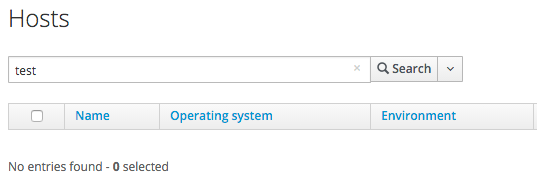
We'll provision a RHEL 6 VM named testserver01 from CloudForms:
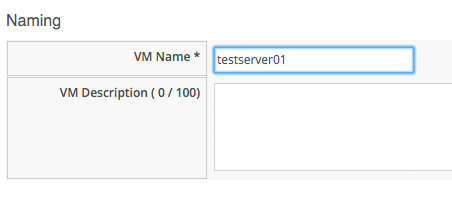
Once the VM has finished cloning, we see the output from register_satellite in automation.log:
<AEMethod register_satellite> Getting hostgroup id for 'Generic_RHEL6_Servers' from Satellite
<AEMethod register_satellite> hostgroup_id: 3
<AEMethod register_satellite> Getting location id for 'Winchester' from Satellite
<AEMethod register_satellite> location_id: 4
<AEMethod register_satellite> Getting organization id for 'Bit63' from Satellite
<AEMethod register_satellite> organization_id: 3
<AEMethod register_satellite> Creating host record in Satellite with the following details: \
{:name=>"testserver01", :mac=>"00:50:56:b8:51:da", :hostgroup_id=>"3", \
:location_id=>"4", :organization_id=>"3", :build=>"false"}
<AEMethod register_satellite> return code => <200>
In Satellite we see the new Host entry, but the 'N' icon indicates that no reports have been received from it yet:
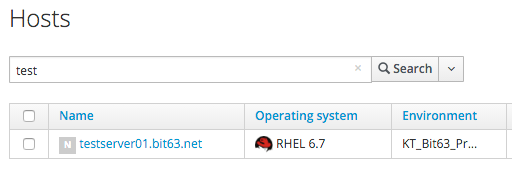
Soon afterwards we see the output from activate_satellite in automation.log:
<AEMethod activate_satellite> VM doesnt have an IP address yet - retrying in 1 minute
...
<AEMethod activate_satellite> IP Address is: 192.168.1.170
<AEMethod activate_satellite> Running ansible-playbook using /tmp/ansible-20151026-26705-68bz0u
<AEMethod activate_satellite> Finished ansible-playbook, results:
PLAY [192.168.1.170] **********************************************************
GATHERING FACTS ***************************************************************
ok: [192.168.1.170]
TASK: [Set hostname] **********************************************************
changed: [192.168.1.170]
TASK: [Install Cert] **********************************************************
changed: [192.168.1.170]
TASK: [Register with Satellite] ***********************************************
changed: [192.168.1.170]
TASK: [Enable Repositories] ***************************************************
changed: [192.168.1.170]
TASK: [Install Katello Agent] *************************************************
changed: [192.168.1.170]
TASK: [Install Puppet] ********************************************************
changed: [192.168.1.170]
TASK: [Configure Puppet Agent] ************************************************
changed: [192.168.1.170]
TASK: [Run Puppet Test] *******************************************************
changed: [192.168.1.170]
TASK: [Start Puppet] **********************************************************
changed: [192.168.1.170]
TASK: [Update all packages] ***************************************************
changed: [192.168.1.170]
NOTIFIED: [Enable Katello Agent] **********************************************
ok: [192.168.1.170]
NOTIFIED: [Start Katello Agent] ***********************************************
ok: [192.168.1.170]
NOTIFIED: [Enable Puppet] *****************************************************
changed: [192.168.1.170]
PLAY RECAP ********************************************************************
192.168.1.170 : ok=13 changed=10 unreachable=0 failed=0
In Satellite we now see the new Content Host entry, showing that all packages have been updated:
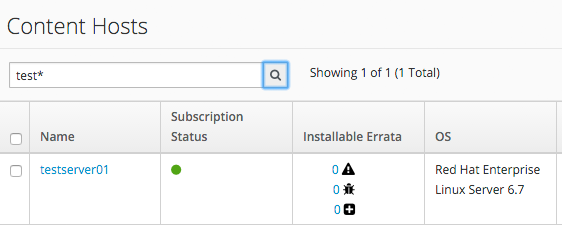
We also see that the new Host record is shown as Active, showing that the Puppet agent is connecting to the Puppet Master:
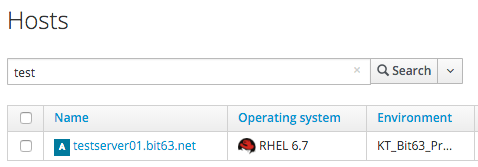
If we are quick we can see the contents of the Ansible playbook file before it is deleted:
---
- hosts: 192.168.1.170
tasks:
- name: Set hostname
hostname: name=testserver01
- name: Install Cert
command: "/usr/bin/yum -y localinstall http://satellite01.bit63.net/pub/katello-ca-consumer-latest.noarch.rpm"
- name: Register with Satellite
command: "/usr/sbin/subscription-manager register --org Bit63 --activationkey
RHEL6-Generic"
register: registered
- name: Enable Repositories
command: subscription-manager repos --enable=rhel-*-satellite-tools-*-rpms
when: registered|success
- name: Install Katello Agent
yum: pkg=katello-agent state=latest
when: registered|success
notify:
- Enable Katello Agent
- Start Katello Agent
- name: Install Puppet
yum: pkg=puppet state=latest
when: registered|success
register: puppet_installed
notify:
- Enable Puppet
- name: Configure Puppet Agent
command: "/usr/bin/puppet config set server satellite01.bit63.net --section agent"
when: puppet_installed|success
- name: Run Puppet Test
command: "/usr/bin/puppet agent --test --noop --onetime --waitforcert 60"
when: puppet_installed|success
- name: Start Puppet
service: name=puppet state=started
- name: Update all packages
command: "/usr/bin/yum -y update"
handlers:
- name: Enable Katello Agent
service: name=goferd enabled=yes
- name: Start Katello Agent
service: name=goferd state=started
- name: Enable Puppet
service: name=puppet enabled=yes
Success!